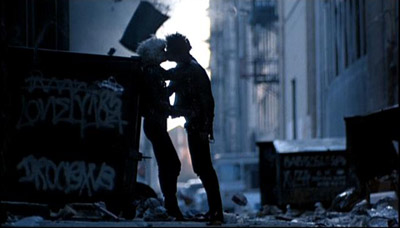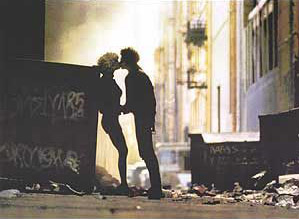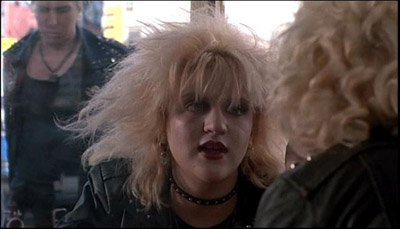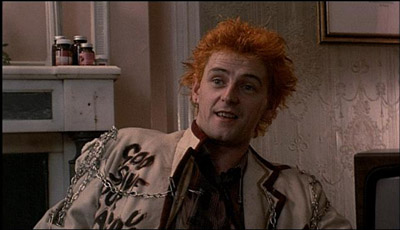Sid and Nancy, 1986, directed by Alex Cox, written by Alex Cox and Abbe Wool.
What can you say about a twenty-year-old girl who died? Well, if she was Nancy Spungen, you can't say much about her being beautiful or brilliant. I don't think she loved Mozart or Bach, and I'm sure she didn't love the Beatles. But she loved Sid Vicious. And I don't think Alex Cox wanted to make Love Story, anyway.
Of course, he didn't want to make The Buddy Holly Story, either. You're kind of setting yourself up for failure when your subjects are Sid Vicious of the Sex Pistols and Nancy Spungen, the camp follower that he may or may not have killed. Most music biopics (e.g., Ray) take for granted that their subject is talented; the story is usually about them trying to wrestle their immense talent into productive directions. You can't really do that when you're making a movie about Sid Vicious—he doesn't give you much to work with. He was the least talented member of a band that was never famous for its skill. In movies like Ray, the movie takes off when the main character gets their personal goals in line with their artistic ones; in Sid and Nancy things don't really get going until Sid leaves the Sex Pistols. To put it bluntly, Sid's artistic goals aren't very interesting; and his psychotic lack of introspection means his personal goals aren't much to look at either. They're funny, though; here's the scene where Nancy brings Sid to her family's home for an incredibly uncomfortable dinner:
GRANPA
So! Are you gonna make an honest
woman of our Nancy, Sid?
SID
Well, she's always been an honest
woman to me, Granpa, so... she's
never lied to me.
GRANPA
But what are your, uh, intentions?
SID
Well, first off, we're going to go
down to the methadone clinic on
Monday and then, uh, Nancy's gonna
get me some gigs. And then we're
gonna go off and, like, live in
Paris, and just sort of go out in a
blaze of glory. But don't worry,
though, you know, you'll be proud
of us.
For what it's worth, Sid achieves every goal but the last one.
The structure of the movie is unusual; it's a straight two-acter. The first half is set in Britain and America and is more closely tied to the actual career of Sid Vicious; it's interesting enough, but it only really transcends the squalor of its main character in the scenes where Cox focuses on Sid's feelings for Nancy Spungen. There's a beautiful sequence during the Sex Pistol's disastrous Silver Jubilee celebration where Sid and Nancy walk through police mayhem like ghosts. It's one long slow-motion tracking shot backwards through the chaos, and it's gorgeous; you really believe these two people have been chosen by fate to love each other.
Cox gives his characters' doomed romanticism full reign in the second half, after the Sex Pistols have broken up. As Sid and Nancy descend into heroin addiction and become increasingly divorced from the world around them, Cox shows them as residents of their own, purely subjective world; notably when Sid's cigarette sets their room at the Chelsea Hotel on fire and the two of them sit in bed watching things burn until they're dragged out. And of course, there's this:

Add a song by Pray for Rain and you're well on your way into mythmaking. The second half of this movie is brilliant; Cox manages to make Nancy Spungen and Sid Vicious not just bearable, but tragic.
By most accounts, they were neither. The DVD features footage from D. O. A.: A Rite of Passage, a documentary about punk that features an "interview" with the two of them. Sid, clearly strung out, keeps passing in and out of sleep, mumbling incoherently while Nancy screeches at him to wake up and answer the filmmaker's questions. Sid lets his cigarette burn a hole in the blanket; Nancy's voice is near unbearable. Gary Oldman's Sid Vicious isn't 100% coherent all the time, but he's worlds ahead of the actual article. Chloe Webb's Nancy isn't pleasant to listen to, but she, too, is cleaned up a bit for film.
That seems to be the main problem people who were there at the time have with the film (I base this opinion solely on the commentary track); Cox wasn't true enough to the actual story. Sid often wore a shirt with a swastika; Cox changed it to a hammer and sickle. I don't really buy the argument that a filmmaker has a responsibility to his subjects or the truth or whatever; I think bending the truth to accomplish narrative ends is a requirement. In this case, I'm willing to forgive a lot; for one thing, I'm not sure I'd want to spend two hours with the real Sid and Nancy. For another, I'll support any story that can make the last scene of Sid and Nancy seem earned; it gave me chills.
Randoms:
- Cox may have prettied up Sid and Nancy's story. The marketing department at Embassy cleaned up Alex Cox's story. Here's the same still from above, as it appears on the movie poster:

- Notice the vanishing garbage, the chopped off arms,
the miniskirt, and Chloe Webb's magical expanding breasts.
- Sid and Nancy marks the film debut of Courtney Love, who called Abbe Wool at home during casting and insisted that she should play Nancy. She didn't get to be Nancy, but she did get to be Gretchen, one of Nancy's American friends. Here she is, pre-diet and pre-nosejob:

- Greil Marcus is on the commentary track, and, wow. He consistently starts with something that seems interesting and then goes off the rails completely. Example: he correctly points out that Sid and Nancy doesn't spend a lot of time placing its characters in a cultural or social context. He's right, and I'm sick of movies that go to great lengths to do this; e.g., Seabiscuit and Cinderella Man. Horses and boxers didn't restore America's broken spirits during the Great Depression. And the Sex Pistols didn't save rock and roll forever, either. So, so far, so good. But Marcus goes on to say that Cox expects the viewers themselves to add social context; that is, to draw the obvious connections between the Sex Pistols and the Gordon Riots of 1780, not to mention the Ranters of the 1640s and 50s. Really, Greil? You think Alex Cox had antinomian religious reformers on the brain when he made Sid and Nancy? And he expects viewers to draw the same comparisons? It takes a lot for me to say someone's intellectually pretentious, but wow.
- Your actors don't have to look like the people they're playing; Oldman's Sid Vicious is great. But. Here's Johnny Rotten on the Bill Grudy show in 1976:

- And here's Andrew Schofield playing Johnny Rotten:

- Not bad. But here's Alex Cox during the filming of Sid and Nancy:

- I dunno, Andrew, I think Alex just wants it more.


9 comments:
nancy: ok, this one's easy... eating...sleeping...fucking...*everything*.
sid: things you do on 'eroin!
What's that from, SNL?
the state, duh. "look...[pfffffffff], i'm a whale!" snl? please.
(sorry, from the sketch in which sid and nancy are contestants on the ten thousand dollar pyramid. i believe it's called "sid & nancy.")
Should have known. Statemedia.net has been offline for too long.
Just to be contrary, I’m going to say Alex Cox did set out to make Love Story: obnoxious girl meets charismatic boy, they fall in love, she dies. (Perhaps there really are only seven basic plots.) And the more I think about it, “Love means never having to say you’re sorry” works pretty well as a tag line for Sid & Nancy, too.
Alex Cox is obviously a painstaking filmmaker. The lack of social or cultural context in Sid & Nancy is deliberate, and I don’t believe Cox expects us to add it. The social context is not germane to the film he has chosen to make. Punk, social anarchy, self-mutilation, snot bubbles and smack are all window dressing. This is a relationship film. Yep, strip away the surly, raucous, hobnail and spike encrusted veneer, and you’ll see Sid & Nancy for what it really is….a chick flick. Even the carefully chosen title is deliberately evocative of another famous pair of doomed romantics (a more reasonable intellectual leap than the Gordon Riots).
Seriously, it would be very easy for someone like me to dismiss a movie like this. But I can’t. I liked it, particularly the third time around (two bravura lead performances help immensely). Because Cox chooses to focus on universal themes of despair and love rather than the history and specifics of one musical idiom, even a middle-aged American doctor who thinks Rosemary Clooney is about the best singer ever can find a way to connect with the story he’s telling.
Nancy was actually intelligent and had a superior high IQ and graduated high school at 15... She was tortured and mentally ill and LOVED the Beatles and loads of classic rock. I read her mother's book and it's sad that she has been demonized by the media. She was mentally fucked and doesn't deserve to be immortalized in music history (and neither does Sid...) She couldn't help herself with her problems. She had fucking schizophrenia for fucks sake! She used to go into fugue states where she'd forget where and who she was. She used to see sharks that weren't there. She smashed her hands into a double paned window to mutilate herself. Her finger was almost severed... She was a sad, sensitive, and mentally ill girl. She didn't do anything tangible or create anything of artistic worth in her lifetime but that doesn't mean she deserved to be turned into a bimbo cartoon via Chloe Webb's ridiculous performance. Read what Richard Hell and her NYC friends wrote about. She could have been your sister, daughter, or mother if they had the same traumatic birth or neurological damage she had. I didn't know her personally but I can relate to certain aspects of her mental problems and I feel bad for her.
Does anyone know what episode of snl the sid and nancy sketch was in?
season 4 episode 3, ... the sketch that was mentioned in Deborah Spungen's book that her brother saw on t.v. .... it was Bill Murray's "Celebrity Corner"
Post a Comment